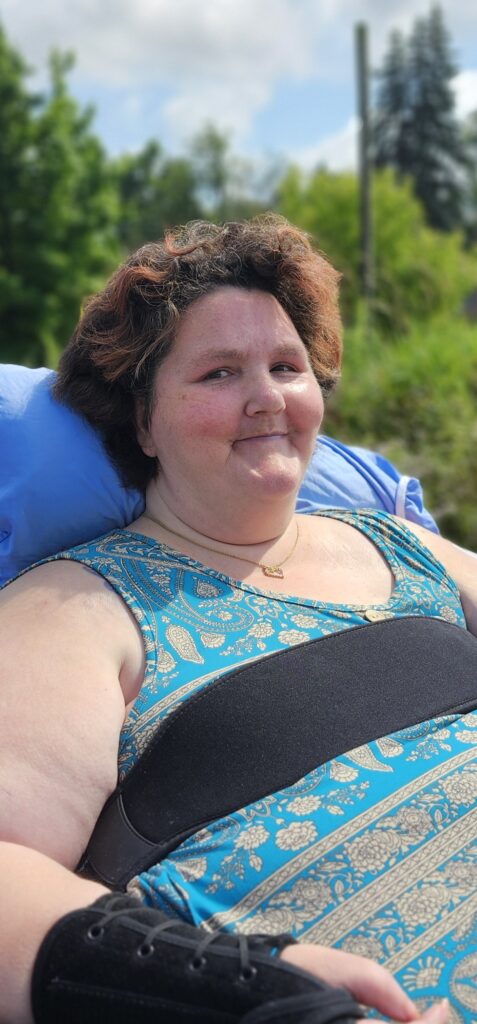Melanie is a 48-year-old fragrance collector and animal lover, currently living in the Peterborough region. For Melanie, a spinal cord injury came after an ordinary day, where she simply went to bed and woke up in the hospital, hours later, paralyzed from the shoulders down. “I had a stroke in my sleep,” shares Melanie. She has been living in the hospital since January 2021.
The stroke changed her life completely – she is labeled bariatric, which proves to be extra challenging. Melanie is considered complex care due to her ongoing health issues and has spent time on nearly every unit of the hospital since being admitted. “I’ve been on every unit except the morgue,” she says, “I had pneumonia and heart failure and nearly died, so I often worry that it will happen again, and no one will get to me in time.”
With nearly three years spent in hospital, Melanie reflects on how much she misses the personal touches of having a home. “I would love to have more personal belongings in sight. Artwork, access to my perfume collection, getting to snuggle my cats – I haven’t seen my cats in over two years,” she shares. While she has her perfume collection in her hospital room, she is restricted from wearing them in a health care setting and deeply longs for a sense of dignity and individuality. With ongoing health issues, she has been in intensive care multiple times throughout her stay, losing any sense of familiarity with staff she was accustomed to on previous floors. Although she has family visiting her frequently, including her father and husband, nothing quite compares to having a home, and Melanie’s well-being is deeply affected by the constant isolation she feels.
Following rehabilitation, she was unable to return home due to complex needs and multiple staff required to assist her with daily activities such as transfers and showers. Moreover, her home was not accessible and did not meet her needs with the use of a wheelchair. She has attempted to apply for supportive housing but has a fifteen-year waitlist ahead of her, which is far from an immediate solution. Melanie was approved for Direct Funding, a program that provides people with disabilities the option to hire their own personal support workers, but with nowhere to live, it has been a no-go.
“I filled out paperwork for MAiD,” shares Melanie. MAiD refers to Medical Assistance in Dying – something more and more Canadians with disabilities are turning to as a last resort due to inadequate supports and resources.
“I feel like I have lost any sense of dignity and live like a prisoner in hospital. You’re always told what to, when to do it. Every day is the exact same with little variation. I need help with literally everything. But we are still human. We still have needs and want to be treated with dignity,” says Melanie, “It would be great if there was more affordable accessible housing. There are more young people having strokes now and there needs to be more community and more places where people can build connections.”
Melanie also shares that she no longer qualifies for physiotherapy – she is told she will not improve as she is a quadriplegic. “What about maintaining function?” Questions Melanie. She also stresses that she does not think it fair to have to take up a hospital bed, clogging the system further, when others may be in dire need of hospitalization.
Recently, Melanie learned that she may be able to have her cats visit her in hospital, which she looks forward to immensely. Still, SCIO’s interview ends on a somber note. “When you live in the hospital for all this time, you feel like you don’t qualify to be human anymore,” says Melanie. “I encourage everybody to make the best of every day – you never know what’s next and you should enjoy as much as you can.”
Update:
Melanie passed away in early 2025 due to health complications. She will be deeply missed.


